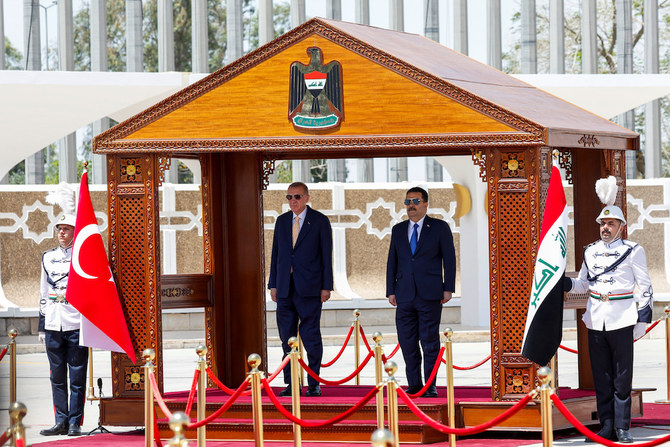ANKARA: As Turkish President Recep Tayyip Erdogan paid a much-anticipated visit to Iraq on Monday, the first in 12 years, the two countries are expected to deepen security and economic cooperation while seeking ways to promote regional stability.
Erdogan’s delegation includes the country’s Foreign Minister Hakan Fidan, Interior Minister Ali Yerlikaya, Defense Minister Yasar Guler, Communications Director Fahrettin Altun, his Chief Adviser Akif Cagatay Kilic and other ministers.
The president’s itinerary includes key meetings with his Iraqi counterpart Dr. Abdullatif Rashid before talks with Iraqi Prime Minister Mohammed Shia Al-Sudani.
In the afternoon, Erdogan was to meet with Kurdish officials in the Kurdistan Regional Government’s capital Irbil.
Experts say the visit will mark a positive shift in Turkish-Iraqi relations.
Addressing Iraqi concerns over water resources and signing strategic agreements on security, energy, trade, transportation, and health are also expected to lay the framework for future avenues of cooperation.
Water supply has become a sticking point in recent years, with Baghdad demanding more water from the Tigris and Euphrates rivers — two main rivers that flow from Turkiye to the Arabian Gulf and account for more than 90 percent of Iraq’s freshwater resources.
In his meetings with Iraqi and Kurdish officials, Erdogan is seeking support for counter-terrorism efforts by jointly tackling the threat posed by the outlawed Kurdistan Workers’ Party or PKK.
Dr. Bilgay Duman, coordinator of Iraq studies at the Ankara-based ORSAM think tank, said Turkiye’s aim with the visit was not to outdo any regional player, Iran or otherwise.
He told Arab News that Ankara “wants to create a regional dynamic given the current tension between Israel and Iran, the regional crises in the Red Sea, and the lack of a solution in Syria, which have necessitated some bilateral cooperation with Baghdad and Irbil.”
Berkay Mandiraci, a senior Turkiye analyst at the International Crisis Group, says a key question will be how Baghdad will support Turkiye’s campaign against the PKK.
Last month, Iraq’s National Security Council declared the PKK an outlawed organization in Iraq, signaling a growing willingness by the Iraqi authorities to fight the terrorist group. But now, the focus is on how Iraq can limit the PKK’s mobility on its territory.
Fidan, the foreign minister, and intelligence chief Ibrahim Kalin visited Baghdad last month.
“As Turkiye, we will work for the stability of Iraq,” Fidan said recently.
“We don’t want Iraq to be associated with internal conflicts.”
For Mandiraci, Baghdad’s acquiescence to backing Turkiye’s fight against the PKK will likely determine the extent of cooperation on other thorny issues such as water and oil.
A series of operations launched by Ankara since 2019 succeeded in pushing the PKK from the northern mountainous regions to Iraq’s southern urban areas, such as Kirkuk, Sinjar and Sulaymaniyah.
“The PKK began to confront the Iraqi central authority while also posing a greater threat to Baghdad. But Iraq has no such experience in confronting the terrorist group on a large scale. That is why it needs to cooperate with Ankara in developing measures and increasing the capacity of its armed forces to fight the PKK more actively. Baghdad is striving to become a state that has full control over internal threats by suppressing the factors of instability,” Duman said.
However, bilateral cooperation should not be limited to the joint fight against the PKK, as it will encompass a broader agenda for regional development.
During the talks, the Turkiye-Iraq Development Road project, which will stretch some 1,200 km and aims to link Iraq’s nascent Grand Faw port to Turkiye’s southern border and then to Europe via railways and highways, also featured on the agenda as it opens a new page in Ankara-Baghdad relations.
According to Duman, Turkiye could propose enlisting the support of the UAE and Qatar in this project by preparing a four-way agreement and actively participating in creating industrial cities and trade centers along this route. This would boost economic dynamism and undermine instability factors by creating wealth.
Turkiye has significantly increased its exports to Iraq this year, with sales rising by nearly $691.5 million from January to March.
Baghdad and Ankara “share an interest in the progress of the Development Road project. As a new trade route, it could play a significant role in stabilizing Iraq in the longer term and bring important economic dividends to both countries,” Mandiraci said.
But he added that building the project would not be easy, with Iran worried about its territory being bypassed.
“And Iran could play spoiler,” Mandiraci said, adding: “It will require careful and multi-vector diplomacy to reduce and manage the security and geopolitical risks associated with the initiative.”
During his visit, Erdogan planned to meet with the President of the Iraqi Kurdistan Regional Government Nechirvan Barzani, while talks were also expected with officials of the Iraqi Turkmen Front and Turkmen community leaders.
Through this visit, Duman said that Turkiye would mediate between Irbil and Baghdad on many fronts, as consensus between the two is crucial in the fight against the PKK and in the continuation of the Development Road project, as security must be restored in the regions crossed by the road.
Senior officials in Ankara have recently hinted at plans for a major military operation against the PKK in northern Iraq this summer.
Turkiye is also seeking to establish a 30-40 km security corridor along its border with Iraq and to supplement it with military installations in coordination with Baghdad.
“For Turkiye, Irbil and Baghdad are not alternatives but complementary,” Duman said.
“During this visit, I expect a joint large-scale operation between Turkiye and Baghdad to eradicate the PKK’s presence in the region to be discussed. But such a joint effort is not limited to the military struggle because, at the same time, the PKK is trying to gain a foothold through civilian formations based in Iraq.
“As its military reach shrinks, it tries to infiltrate the civil and political sphere. Iraq and Irbil may try to deepen cooperation with Turkiye in this area.”














